|

Spring
1999 (7.1)
Pages
65-69
Quest for
Freedom
(1960-1991)
Profile
of a Dissident
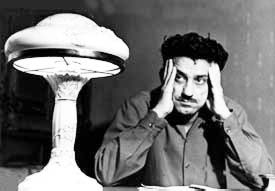
Bakhtiyar Vahabzade
(1925-February
13, 2009)
by
Jean Patterson
AI
7.1 Special Feature Articles
Late one night
in 1952, Azerbaijani poet Bakhtiyar Vahabzade lay wide awake
in bed.
He couldn't stop thinking about the conversation he had had earlier
that day with a close friend, composer Gambar Huseinli. They
were both critical of the Soviet government, but at the same
time suspicious of each other and afraid to talk about it openly.
Huseinli had already been arrested once before, allegedly for
referring to Stalin as a "dictator" in a private conversation.
Right: Bakhtiyar Vahabzade
in 1969
Earlier that day, Vahabzade had asked Huseinli why he had been
arrested. Huseinli had exploded in anger, cursing Stalin and
complaining about how badly he had been mistreated. He regretted
his words at once, and suddenly halted his tirade. Trying to
console him, Vahabzade admitted that he agreed with him about
Stalin, that the man was a cruel dictator who had killed thousands
of innocent people.
Later that night, a sleepless Vahabzade worried about having
been so honest about his own beliefs. Huseinli had just been
released from prison. Was he a spy for the KGB? He had heard
that political prisoners were often recruited as such. Would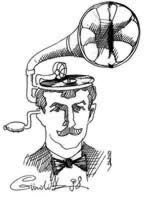 his friend turn him in? Paralyzed
by fear, Vahabzade decided to go to Huseinli's house first thing
in the morning and beg not to be betrayed. his friend turn him in? Paralyzed
by fear, Vahabzade decided to go to Huseinli's house first thing
in the morning and beg not to be betrayed.
That night, shortly after 1 a.m., Vahabzade heard a car stop
outside his house. During the repressive Stalin era, political
prisoners (including poets who refused to conform to Soviet ideals)
were usually arrested at night. Cars called "black ravens"
would pull up around 2 a.m. There would be the sound of footsteps,
a knock at the door, then people would be whisked away, never
to be seen again. Was it his turn? Vahabzade panicked, got up
and burned anything that he thought could be used as evidence
against him - namely the anti - Soviet poems he had written over
the previous decade but had shown to no one. A few poems he decided
not to destroy. He hid them inside his mother's artificial leg.
Left: Sketch by Gunduz
It turned out that the car was not a police car and had come
for someone else. Early the next morning, as he was getting ready
to go visit Huseinli, there was a pounding on his door. Outside
was a terrified Huseinli, who also had not slept all night. He
begged Vahabzade not to turn him in. They both took back their
words from the day before, repeating to each other, "Stalin
is our father, he is our leader."
Vahabzade later wrote about this experience in his poem "Two
Fears" (Iki Gorku) (1988) which he published on the eve
of the collapse of the Soviet Union. He vividly evokes the Stalin-era
atmosphere of suspicion and distrust of even closest friends.
Two Fears
(1988)
(Dedicated
to the memory of our deceased composer Gambar Huseinli)
He was a friend
of mine, Composer Gambar,1
Whose songs ever smelled of the native land.
The sweet songs we two had once composed
Were passed from mouth to mouth.
He had never
told me, but I knew that
He had been arrested some years before.
But I did not know what his fault was.
I never asked him, nor did he tell.
Once Gambar
was complaining to me
about his life,
I felt heaviness of heart...
I asked him:
But why did they arrest you?
Suddenly he exploded like a bomb:
Don't you know why?
Because I had cursed the world.
I had called "The Father of the Nations," 2
enemy.
Then he became
frightened of what he had said,
And suddenly stopped, not breathing a word.
Evidently, he was afraid of me,
Thinking I might be a spy.
"Sorry,
I got excited," he said suddenly,
"Sometimes I don't know what I'm doing."
I felt the humility in Gambar's voice,
But in a way he was right to be suspicious.
I supported
everything that he said
In order to dispel his doubts...
After arriving home from Gambar's place
I started thinking,
Fear and agitation gave me no peace.
I remembered our talk...
I said to myself,
you fool,
Why did you get yourself into trouble?
Why did you confirm his words after all?
How do you know that Gambar was not saying
Those words against that despot deliberately?
When thousands of innocent people
have been executed,
And thousands exiled,
Will they set someone free
Who has called the government leader "enemy"?
Where was the logic in this, after all?
I couldn't believe his curses were honest.
What if he were complaining deliberately
about his life, about the times,
What if he were trying to get my opinion.
And what did I do? Me, fool that I am,
told him what I thought.
That night I
couldn't sleep,
With thoughts I fought...
What thoughts did I have:
When they come to imprison me,
They will search my archives,
And then my writings, dear me.
I thought what
I had, white or black!
Like a stranger I looked inside myself,
Then got out of bed at midnight,
And began scrutinizing my poems.
Like an inspector,
I looked at the poems
still unpublished
And a shudder came over me.
"If they find these," I said to myself,
"That despot will kill me,"
Maybe to burn
them? What else could I do?
After all, who is indifferent to the life he leads?..
Such trouble to burn the poems
That demand truth and justice from this world!
I have to sacrifice my thoughts and feelings
Just to live out the rest of my life!
My body became
cold, my heart trembled
With the fire and flame of the burning poems.
But I spared some of them
Saying, "It is enough,"
Saying, "That'll do."
I spared some
of my poems that day,
Crumpled papers still remain.
I hid them for the future,
I hid them in my mother's artificial leg.
I turned over
my thoughts and judgments
page by page:
"As soon as the dawn breaks
I'll go to him.
I'll ask him not to betray me,
I'll tell him I was lying yesterday,
'Let's keep it between ourselves.
I was agreeing just to support what you had said.
In fact, I love that genius leader very much.
He has bestowed these happy days upon us.
He is our only support in this world,
He is our thinking brain, our seeing eye.'"
"What a
mistake I've made,"
Thinking so till morning, I blamed myself.
As soon as the dawn broke, I got up and dressed.
At the same time, someone began knocking
at the door...
Who might it be so early in the morning?
I stood before the mirror
My body trembling.
I had no strength even to open the door.
"He must have already betrayed me last night.
They're coming to arrest me, where shall I flee?"
And knocks continued-
Knock, knock and knock.
The knocking wouldn't cease
Without achieving its aim...
"Who's there?"
"It's me, brother."
It was Gambar's voice.
That was enough for me.
Perhaps he had come as a witness,
Or come to make me be silent.
I opened the
door with trembling hands,
He fell on my neck and embraced me,
And began crying bitterly.
He cast a sorrowful glance
To the left, then to the right.
Began hastily interpreting
The talk we had had a day before.
"I was just joking yesterday;
In truth, I love that genius leader.
He is our only support in this world.
He is our thinking brain, our seeing eye."
I understood
him,
But kept silent... Realizing the falsehood
Of all those interpretations.
Time had made hypocrites of us all,
Making us deny all we had said a day after our talk,
It turned out he also had not slept that night.
Footnotes:
1 Gambar
Huseinli is perhaps most fondly remembered for his children's
song, "Jujalarim"
- My Little Chicks [See
AI 5.4, Winter 1997]. Sound Sample: www.azer.com. Up
2
The
father of the nations - meaning Stalin. Up
Can
the country that has such guns be afraid of anything?
But you are afraid of everything even today
And yesterday, you were afraid.
One bright mind, One worrying heart
Are more frightening to you than thousands of H-bombs!
(Words
directed at the U.S. but intended for the USSR) - Bakhtiyar Vahabzade
Much of Vahabzade's
poetry did criticize the Soviet system. Sometimes, he kept those
poems private. Some of the others that he managed to get published
incorporated clever strategies to circumvent Soviet censors.
Early Struggles
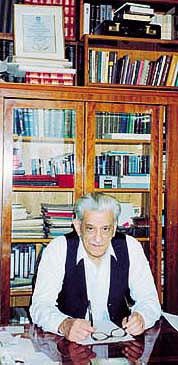  Vahabzade's resistance
to the Soviet government began during his early Vahabzade's resistance
to the Soviet government began during his early  childhood
in Shaki, a mountain town in northwestern Azerbaijan. In 1930,
there was an uprising there against the Soviet government's collectivization
policy. Vahabzade, who was five years old at the time, remembers
clearly how the Soviet army sent from Baku cruelly suppressed
the protesters. Thousands of people were jailed; some were shot,
others fled into the mountains and lived as outlaws. The government
continued their pursuit of them for more than a decade. childhood
in Shaki, a mountain town in northwestern Azerbaijan. In 1930,
there was an uprising there against the Soviet government's collectivization
policy. Vahabzade, who was five years old at the time, remembers
clearly how the Soviet army sent from Baku cruelly suppressed
the protesters. Thousands of people were jailed; some were shot,
others fled into the mountains and lived as outlaws. The government
continued their pursuit of them for more than a decade.
Vahabzade's family had a deep hatred of the newly installed Soviet
government. Several close relatives had died in the uprising.
"Outlawed Abbas," famous for his bravery and fearlessness
among the people, was captured and killed. It was the first corpse
Vahabzade had ever seen in his life. He remembered, "I saw
how my grandfather sitting in front of the window cried bitterly
over his death, and how my grandmother, wearing a black silk
scarf over her head, was wailing the loss."
In 1933, Vahabzade's father and uncles were arrested for helping
the outlaws but were released when a relative in the police force
intervened. To escape further danger, the family fled Shaki for
Baku.
Left:
Bakhtiyar
Vahabzade in his study, 1992.
Growing up witnessing these violent events, Vahabzade became
more and more indignant against Soviet authority. While in high
school in Baku, he started channeling his anger into poems, describing
feelings that could not be expressed publicly.
In the meantime, he pursued a career as a poet and professor.
In 1942, Vahabzade was admitted to Azerbaijan State University
to study philology and later became a professor there. In 1945,
he was accepted as a member of the Soviet Union's Writers' Union.
If, in
your mother tongue, you cannot say
"I am free, I am independent."
Who can believe that you really are?
- Bakhtiyar
Vahabzade
Defending the use of
Azeri
One
thing about Soviet Azerbaijan that particularly upset Vahabzade
was that his native Azeri tongue was being systematically replaced
by Russian. In one poem he wrote, "Once it would flow fluently/
But today it is frozen./ My mother tongue is so miserable today/
As if it has been trampled."
In his poem "Mother Tongue" (1954), he vents his frustration
at the substitution of Russian for his mother tongue. Naturally,
it was difficult for him to get the poem published. When the
famous Azerbaijani poet Samad Vurgun heard about the poem from
his son Yusif, he told Vahabzade that he would help him publish
it. As Vurgun and Vahabzade sat n his study, reviewing the poem,
Vurgun suggested that he add an epitaph from Lenin to serve as
a "shield". It read, "We love our mother tongue
and our country." Since the words could be directly attributed
to Lenin, no one could accuse Vahabzade of being nationalistic.
The poem was published a few days later.
This kind of technique soon became a characteristic feature in
Vahabzade's work. In order to outwit the censors, he masked his
true intent by transferring Azerbaijan's problems to a different
time period or a different geographical setting. In this way,
he could address contemporary issues by simply displacing them
from the context of Soviet rule.
For instance, "The Roads, The Boys" (Yollar Ogullar)
(1964) is a poem about the national liberation movement in Algeria.
Vahabzade realized that the Algerians' struggle also epitomized
Azerbaijan's struggle against the Soviet government. But he succeeded
in getting the poem published. A friend informed the KGB, accusing
Vahabzade of criticizing Russia. It was Mehdi Husein [see Underground
Rivers Flow into the Sea], then secretary of Azerbaijan's Writers'
Union, who vouched for Vahabzade, insisting that the poem was
not anti-Soviet.
In the 1970s, Vahabzade decided to write a poem about Andrei
Sakharov, the famous Russian physicist who was being threatened
for his anti-Soviet opinions. Vahabzade wanted to write about
the scientist's brave protests, but dared not. Instead, he concentrated
on Linus Pauling, who had been blacklisted in the U.S. He knew
his readers would recognize that he was actually alluding to
Sakharov and the USSR, not Pauling and the U.S.
Dawn
(1972)
American chemist
Linus Pauling (1901-1994), the focus of Vahabzade's poem "Dawn,"
was awarded the International Lenin Prize (1970) "For Consolidating
Peace Among Nations" and the distinguished honor of two
Nobel Prizes, one for Chemistry (1954) for his work on chemical
bonds. His second, the Nobel Peace Prize (1962), was awarded
for his efforts on behalf of the nuclear test ban treaty that
was signed in 1963.
During the 1950s, Pauling became a victim of the McCarthy-era
"witchhunts" in the U.S. His passport was withdrawn
by the State Department because his "anti-Communist statements
were not strong enough." In fact, this travel restriction
almost prevented him from going to his own Nobel award ceremony.
Pauling was targeted because he spoke out repeatedly against
official U.S. government policies during his campaign for peace,
disarmament and the end of nuclear testing.
(Addressing the U.S. government)
You have your own position
In the line-up of governments.
You have atomic and H-bombs,
You have tanks and cannons,
You have these weapons,
You have those weapons!
Can the country
that has such guns
be afraid of anything?
But you are afraid of everything even today
and yesterday, you were afraid.
One bright mind,
One worrying heart
Are more frightening to you
Than thousands of H-bombs!
You were never
afraid of atomic bombs
As much as you are afraid of such thoughts
of such minds!
Why did you become afraid of one mind
Which was able to separate colored lies
from the truth,
To distinguish truth from abomination?
-I know why!
If Linus is a slanderer, if he is a liar,
Then why do you hold back what he has said
from the people?
And why are you arresting him?
(Addressing
courageous ones like Linus Pauling)
You who suffer because of the Motherland,
You who don't keep silent but ever speak,
You were destined for death and jails!
(Again addressing
the U.S. government)
You have atomic bombs; you have missiles,
In spite of all these weapons, you are afraid.
The heaviness of this fear
Is the weight and price
Of the harm you have done.
Look at that scarlet horizon,
It is dawn,
It is dawn!
Despite this
literary sleight of hand, Vahabzade's readers read between the
lines and understood what he was saying. He even believes that
some of the censors understood, but let the poem slip through
if they could do so without being caught.
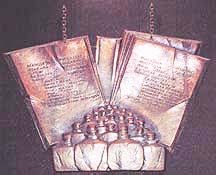 Photo: A plaque in the Writer's Union gives
tribute to 25 writers who were killed during the repressive years
of Stalin. The names include: Photo: A plaque in the Writer's Union gives
tribute to 25 writers who were killed during the repressive years
of Stalin. The names include:
Amin Abid, Kazim Alakbarli, Yusif Vazir Chamanzaminli, Bakir
Chobanzade, Sultan Majid Ganizade, Gantamir, Mustafa Guliyev,
Seyid Husein, Ahmad Javad, Husein Javid, Ismayil Katib, Vali
Khuluflu, Salman Mumtaz, Atababa Musakhanli, Mikayil Mushfig,
Alabbas Muznib, Hajibaba Nazarli, Ali Nazmi, Omar Faig Nemanzade,
Aghahusein Rasulzade, Ali Razi, Haji Karim Sanili, Taghi Shahbazi
Simurg, Boyukagha Talibli and Hanafi Zeynalli.
The most
famous of these writers are featured in this issue: Ahmad Javad
(27), Husein Javid (20) and Mikayil Mushfig (26).

A Close Call
Some
poems did not manage to "slip through". For example,
Vahabzade narrowly escaped serious trouble for writing "Baku"
(1956). In this poem about 18th-century Azerbaijan, Vahabzade
describes the fortress walls that surround old Baku but actually
refers to Soviet Azerbaijan:
Those stones
piled up like teeth,
The honor of our ancestors is valuable for us.
Those white stone teeth showing
Are clenched
Showing the hatred towards foreign enemies.
A well-known poet turned him in for this poem, saying that it
was "anti-Soviet." The poet wrote a letter to the secretary
of the Writer's Union, Ali Valiyev. Fortunately, Valiyev was
looking out for Vahabzade, the friend of his son. Valiyev dictated
a statement to help him clear his name. It read: "While
saying 'foreign enemies,' I haven't meant the present time but
the times when the fortress walls were built. Because these fortress
walls surrounding Baku were constructed with the purpose of defending
Baku from the foreign enemies in those days." Valiyev showed
the statement to the informant and told him to put an end to
the matter.
Getting Caught
Vahabzade was not always able to dodge his censors and detractors.
One of his poems even cost him his job. In "Gulustan"
(1959), Vahabzade objects to the division of Azerbaijan into
two parts by the Gulustan Treaty of 1813. This treaty between
Russia and Iran assigned "Northern Azerbaijan" (the
modern-day Republic of Azerbaijan) to Russia, and the other part
which is commonly referred to as "Southern Azerbaijan"
to Iran. Vahabzade's poem was too controversial to be published
in the mainstream press, but he managed to get it printed in
"Shaki's Worker" (Nukha Fahlasi), a newspaper in his
hometown. Word of the poem soon spread throughout Azerbaijan.
When the Central Committee found out about it in 1962, Vahabzade
was fired from his job as a university professor and branded
as a "nationalist".
Vahabzade also got into trouble for questioning the Soviet Union's
suppression of the Azeri language. During the Soviet period,
the Azeri language, like the national languages of other Republics,
was systematically replaced with Russian, which became the official
language of all government dealings.
As more and more parents sent their children to Russian-language
schools, the number of Azeri-language schools decreased. Sometimes,
the children who were taught in Russian could barely speak Azeri.
Vahabzade sent his own children to Azeri-language schools and
often argued with parents who did otherwise. When he found out
that his son's literature teacher was sending his own children
to Russian-language schools, he angrily confronted him and questioned
his logic. (Without Azeri-language schools, the teacher would
have been out of a job.) The next day, Vahabzade wrote a poem
about the incident entitled "Hypocritical".
Vahabzade believes the existence of any nation is first of all
connected with its language. As he puts it, "'No language'
means 'no nation.'" Throughout his career, he has repeatedly
mourned the suppression of Azerbaijan's mother tongue.
The most prominent expression of this outrage is in his poem
"Latin" (Latin Dili). In 1967, Vahabzade visited Casablanca
and found a similar case: the indigenous language was dying out
there because it was no longer the official language. In his
poem, he writes that the Latin language is not really a "dead"
language-it is used today throughout the world by doctors and
academics. The original nation no longer exists, but the language
does. On the other hand, a contemporary nation that no longer
uses its mother tongue does not fully exist. He writes:
If, in your
mother tongue, you cannot say
"I am free, I am independent."
Who can believe that you really are?
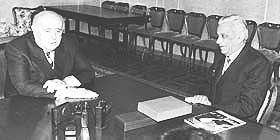  Line of Defense Line of Defense
To cover himself, Vahabzade wrote "Casablanca" at the
bottom of the poem to detract from its intended geographic context.
The KGB was suspicious, but even after questioning Vahabzade,
they couldn't prove that the poem was actually about Azerbaijan.
Vahabzade defended himself by maintaining that the poem was about
the Arabic language,  not
Azeri. not
Azeri.
Photo:
Poet Bakhtiyar
Vahabzade (right) meeting with Suleyman Demirel, President of
Turkey (1995).
In private, he wrote a poem about the experience,
"In the Mourning of Others," describing himself:
"Assigning my people's troubles to others,
I wept for my loss through their mourning."
After writing "Latin", Vahabzade was called into a
meeting with Jafar Jafarov, a scientist-critic who worked as
an ideological secretary of the Central Committee. One of Vahabzade's
friends, Teymur Elchin, was also there. When Vahabzade defended
himself by saying that his poem was about the Arabians, Jafarov
exploded: "Do you think we're idiots? We know perfectly
well what you're talking about. You've been reprimanded before-when
will you learn your lesson?" He threatened to have Vahabzade
fired from his job.
Vahabzade still insisted that the poem was about what he had
seen in Casablanca. Elchin laughed at his words and said to Jafarov,
"I think he sees his mistake. In the future he will be more
careful." A few days later, Vahabzade learned from Elchin
that Jafarov had been directed by the KGB to try to "cultivate"
him. After that, it was much more difficult for Vahabzade to
push his poems past the censors.
Today, Bakhtiyar Vahabzade's situation is quite different. He
is known as the "People's Poet of Azerbaijan" and is
an independent member of Parliament. Some of his more controversial
works have been published for the first time in volumes such
as "Fairy-Tale Life" (1991) and "The Bridge Has
Come Far From the River" (1996). An English-language collection
of his poems and short stories, "Selected Works of Bakhtiyar
Vahabzada," was recently published by Indiana University
Turkish Studies Publications. The New York Times even featured
him in a Octo-ber 9, 1997 article by Stephen Kinzer entitled,
"In Azerbaijan, Poets Tear Down the Fences."
Fairy-Tale Life
(1964)
Though you are my own mother,
I am so upset with you, mom...
You taught me to feel and to think,
But I wish I had been deprived
of feeling and thinking.
You taught your baby to see, to speak,
But I wish I had been born deaf-mute
to this world.
Taking me by
the hand you taught me to walk,
I went round mountains, round lowlands.
Instead of teaching your baby to walk and to run,
You should have taught him how not to fall...
Thoughts flow over me layer by layer,
Answers too venturesome, questions forbidden.
Life is strange to those who know it,
But so familiar to those who don't know.
Where are you?
My only mom, where are you?
Come! I want to put my head upon your lap again.
Tell me tales again, let the time stop,
Let me see how heroes in those tales
Conquer double-headed ogres,
And how they escape from wizards.
Tell me, where is peace?
Why won't it come to our lands?
Don't tell me
anything, don't, mom, keep silent.
I can't understand the legends you tell.
I've seen such real giants in the world
Ogres from those tales are like chicks in comparison.
I've seen such ignorant and stupid persons
Who call hills, slopes and slopes, hills,
just to please others.
I've seen such foxes that call
The steel chains on their arms, bracelets.
I've seen bandits
relaxing
After ransacking their own countries.
I've seen merchants who have sold
Their Motherland not for jewels
But for simple applause, "Good for you's."
I've seen old
women, atheist, godless,
Who call roses, thorns and thorns, roses.
I've seen leaders, brutal, merciless,
Cursing their fathers, bowing down to others.
Since the time
I have felt this world and known it,
Life has fallen into disgrace for me.
The horrible things that appear in fairy-tales,
I have seen in real life in this world, mom.
Mazahir Panahov
contributed to this article and Aynur Hajiyeva translated the
poetry.
From
Azerbaijan
International
(7.1) Spring 1999.
© Azerbaijan International 1999. All rights reserved.
Back to Index
AI 7.1 (Spring 99)
AI Home
| Magazine
Choice | Topics
| Store
| Contact
us
|


 his friend turn him in? Paralyzed
by fear, Vahabzade decided to go to Huseinli's house first thing
in the morning and beg not to be betrayed.
his friend turn him in? Paralyzed
by fear, Vahabzade decided to go to Huseinli's house first thing
in the morning and beg not to be betrayed.
 Photo: A plaque in the Writer's Union gives
tribute to 25 writers who were killed during the repressive years
of Stalin. The names include:
Photo: A plaque in the Writer's Union gives
tribute to 25 writers who were killed during the repressive years
of Stalin. The names include: 